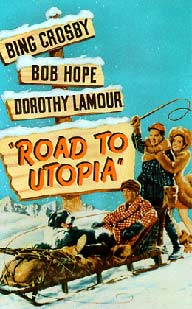|
LITR 5439 Literary & Historical Utopias |
|
Michael Luna
Utopian Past Passes Wisdom
Upon signing up for this class,
I was prepared for studying different genres of literature as well as the styles
created and the different movements that literature has undergone through our
history. However, I found that this course is strictly about utopian literature
and, to be honest, I was a bit confused. Something that has helped greatly is
reading what other students who have taken this course said about the concept of
a utopia and other attributes that are associated into building one. After
reading through a few of the students samples, I was able to gain a much better
appreciation and understanding of what utopian literature is all about. At the
beginning of the course, I read More’s
Utopia
and Perkins Gilman’s
Herland so I would get
ahead on the class readings. What I found was that I was disappointed in what I
read because it was very plain and boring to read for me. Yet, as I started to
read student writings about the readings, it started to make a bit more sense to
me. I discovered that I do have a bit of a bias towards utopian literature and
it was good to read that I was not the only one. The objectives started to make
more sense and I am now able to tie the objectives into the readings much more
easily. As I read the previous postings, I found that I needed to dig much
deeper at what I was reading and look for the meaning that was not hidden from
plain sight. The readings helped me to define utopian literature and appreciate
it much more, for what it attempts to accomplish.
Perhaps one of the more
difficult aspects of utopian literature is in trying to find out how to describe
the style. I could simply say that utopian literature is a style that portrays a
perfect society, but this would be an inaccurate label. Utopian literature tends
to be didactic with small instances of novelistic charm. There are instances of
Socratic dialogue, adventure, propaganda and persuasion included in utopian
literature. Some utopian readings contain only a few deviances from
instructional text, while others, the more modern, include various styles
intertwined within. It was good to go from reading something as bland as
Utopia to reading a story with a little more
character;
Herland. It was even more satisfying to follow
up with Ayn Rand’s
Anthem and Callenbach’s
Ecotopia.
While each of these novels includes an instance of adventure and tract the
discernment between what was going on in utopian texts was still a bit of a
puzzle and this is where reading former students’ papers helped my understanding
grow.
One of the first readings to capture my attention was the
posting by Amy Shanks titled “The Wizard of Oz as a Utopian Tale.” In this
reading, I found another student who had a difficult time figuring out what to
write about as a topic and then discovering that it is going to take an in-depth
look at the genre of utopian literature. Online journal articles are a key to
helping understand utopian literature, and this posting reinforced this
understanding. While I did look up some online journals, most of my reliance
fell upon the readings in the class. However, I do feel that while the readings
served a purpose, it is the analysis of others that truly provides an insight
into what is being discussed about utopian literature. This reading also opened
my mind to looking up other stories that I have read in which the author created
a fantasy world to see if the world is simply fantasy or if there is an
underlying utopian world that the author intended.
Another reading that helped me understand
what utopian literature is is the posting by Sarah Coronado. Her posting, titled
“Human Progression in Utopian and Dystopian Literature” was essential in my
forming an understanding of how this type of literature does not just exist to
tell stories of ideal societies. There are several ways in which utopian
literature can serve in an instructional manner outside the classroom. There is
an obvious reason why our American curricula focuses on dystopian literature as
it relates more to the human condition of fighting for individuality and
dystopian novels are better received by readers due to their inclusion of
novelistic concepts. While I do agree that this is true, I found it hard to find
what was interesting on the human scale about utopian literature. Granted, I
love reading dystopian literature because I have the opportunity to feel myself
as that character who is struggling against the odds to better himself and to
find out who he really is. Before reading Sarah’s posting, I found it hard to
picture myself as More as he created his story of a utopian island. Her posting
caused me to go back and look at these characters with a proverbial magnifying
glass so I could see what was going on within the depths of these characters.
What I found was something that was worthwhile. More wanted the reader to
understand that there is a level of human progression that must occur in order
to achieve a utopian society. While More did create an island getaway, the
inhabitants were people who were able to get themselves away from the daily
temptations of greed, violence and other malicious practices. I definitely
understood this with
Anthem, but I did have a
hard time finding this in
Utopia and
Herland,
and thanks to the information provided by Sarah, it became clear.
Another lingering question that I have
had since entering this course and finding out that we were studying utopian
literature is this: “Are utopias as perfect as they claim?” While I do have my
own reservations about a utopian society, Haylie Unger’s post, titled “Desire:
the Drive and the Destruction of Utopias”, helped solidify my previous thought.
Her posting also helped me understand how a perfect society can be its own worst
enemy. Haylie writes how a desire to create a better living space drives people
towards the creation of a utopian concept. I have found this to be true many
instances in the real world. We have created suburbs, intentional communities,
clans, guilds, cults, call them what you will, in an attempt to belong to
something that is exactly what we want. This desire can be bad, though. In
Haylie’s post, she writes about how the desire to make life better is the
driving force in creating a utopia, yet desires are immediately expunged from
society in order to maintain a utopia. This appears to be a true statement. When
looking at
Anthem and seeing how the World Council punishes
those who think of themselves and not of their brothers first, Rand reinforces
the idea that Haylie brings up; desire is only good at the beginning, but bad
afterwards.
Ultimately, I have found myself learning
quite a bit from looking at what students from the past have had to say about
utopian literature. I do pride myself on being a Literature Teacher and not an
English Teacher, yet I found that I struggled when it came to fully appreciating
utopian texts. I did not know how to properly categorize it, analyze it or dive
into it. Yet, reading postings, combined with classroom discussions, has opened
up my mind to what utopian literature does. I came in with a bias against
utopian literature because of my very limited exposure to it. I read the first
two readings and quickly dismissed them due to their tendency to ramble on and
sound like encyclopedia entries. However, once I had the chance to talk about
them and then read interpretations and analyses on them, I began to see what I
was missing due to my, then unknown, bias. Although these women may never know
it, they have been integral in helping me to understand what utopian literature
is.


